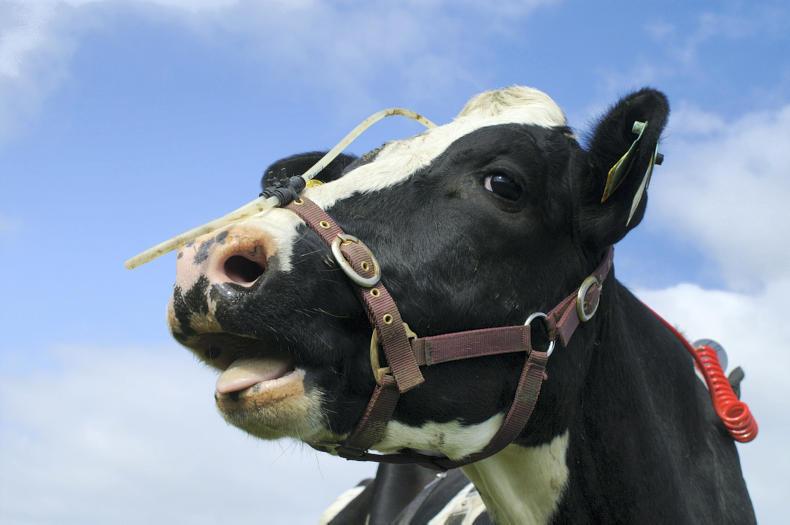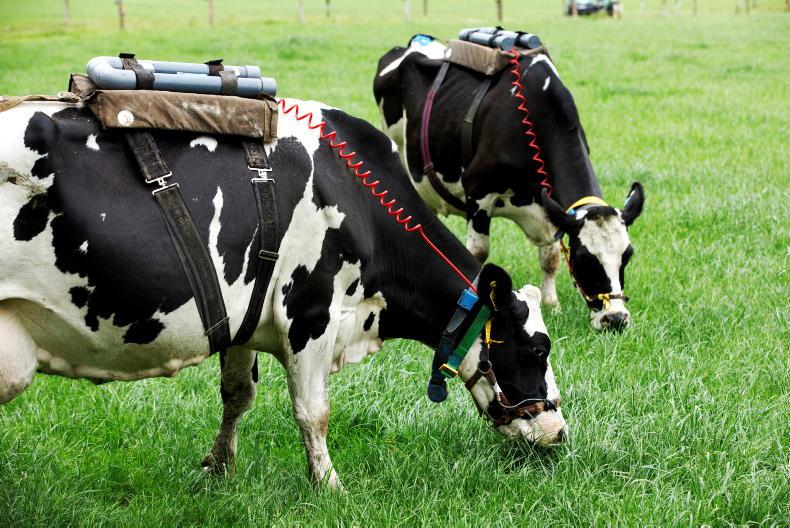A modest reduction in methane emissions from ruminant livestock has the same impact on global warming as dropping carbon dioxide (CO2) emissions to net zero, a leading climate change expert has said.
Professor Myles Allen specialises in quantifying human influence on climate at the University of Oxford and is a member of the United Nation’s Intergovernmental Panel on Climate Change.
In an interview with the Irish Farmers Journal, he explained that a steady rate of methane emissions does not affect global temperatures in the same way as CO2 emissions.
This is because methane has a short lifespan in the atmosphere of around a decade, whereas CO2, which is emitted from burning fossil fuels, remains in the atmosphere for centuries.
“A farmer whose herd is reducing emissions gently, at 0.3%/year, or 10% over a 30-year period, is having the same impact on global temperature as a power station owner who has closed down, or a car driver who is not driving any more,” Allen said.
He maintained that a reduction in greenhouse gas emissions from agriculture could come from improved on-farm efficiencies and does not necessarily require a decrease in livestock numbers.
Allen pointed out that research is ongoing into feed additives and vaccines, which in the longer term could reduce methane-producing bacteria in ruminants and therefore lower greenhouse gas emissions from livestock farming.
“The point is that 0.3% isn’t very much. You’ve only got to come up with one invention every 30 years that reduces your methane emissions by 10% and you’re not causing global warming anymore.
“That’s obviously a challenge, but nevertheless it is also an opportunity for farmers to contribute,” he said.
Increased emissions
However, while a small reduction in methane emissions has a significant impact in offsetting global warming, Allen says the flipside is that any rise in methane emissions leads to a substantial increase in global temperatures.
“This is not a ‘farmers get off scot-free story’, because if farmers want to increase their emissions they should, in principle, have to pay a very large amount to fairly reflect their increase on global temperatures.”
In his latest research, Allen has proposed a carbon pricing system which reflects the different global warming properties of CO2 and methane.
The existing EU system for carbon pricing is based around CO2 emissions, but does not apply to agriculture. However, Allen calculates that if it did, a standard cow emitting 100kg of methane each year would cost the farmer around €70/year under the system.
He argues that this should be reduced by around a quarter to €17.50, to reflect the shorter lifespan of methane compared with CO2.
However, if a farmer is reducing methane emissions at a rate of 0.3%/year, then they should not have to pay an annual fee, the Oxford-based academic said.
Meanwhile, if the farmer wants to increase their herd size and subsequent methane emissions, Allen’s calculations suggest that the farmer should have to pay an upfront capital charge of around €5,000/cow, plus the annual fee of €17.50/cow.
System comparison
There have been several attempts by scientists in the past to compare the carbon footprint of different types of dairy and beef production systems through calculations known as lifecycle analysis.
Allen questions the ability of these studies to accurately compare the likes of grass-based production systems to grain-fed cattle in a feedlot, if the calculations were based on “the flawed way of equating methane”, which does not reflect its shorter atmospheric lifespan.
“They worked out lifecycle impact based on the so-called CO2 equivalent emission, but that is not the same as impact on global temperature.
“We would be very keen to re-visit those lifecycle analyses using this more accurate way of representing the impact of methane to see how the different approaches to production compare,” he said.
Methane in NI ag
The Efficient Farming Cuts Greenhouse Gases implementation plan for 2016 to 2020, published by the NI agri food industry, highlighted the extent of the issue for local farming. In total, agriculture accounts for 28% of greenhouse gas emissions in NI, so is the largest contributing sector ahead of transport, on 21%. The main greenhouse gases coming from agriculture are carbon dioxide from the burning of fossil fuels (9%), nitrous oxide mainly from fertiliser (26%), and methane produced mainly by ruminant animals during digestion (65%). As a result, any scientific work that can help to reduce methane from livestock is potentially critical for the agri food industry in NI.
Read more
Letter: methane emissions wrongly attributed to ruminants.
Is reduced tillage an effective mitigation for CO2 emissions?
A modest reduction in methane emissions from ruminant livestock has the same impact on global warming as dropping carbon dioxide (CO2) emissions to net zero, a leading climate change expert has said.
Professor Myles Allen specialises in quantifying human influence on climate at the University of Oxford and is a member of the United Nation’s Intergovernmental Panel on Climate Change.
In an interview with the Irish Farmers Journal, he explained that a steady rate of methane emissions does not affect global temperatures in the same way as CO2 emissions.
This is because methane has a short lifespan in the atmosphere of around a decade, whereas CO2, which is emitted from burning fossil fuels, remains in the atmosphere for centuries.
“A farmer whose herd is reducing emissions gently, at 0.3%/year, or 10% over a 30-year period, is having the same impact on global temperature as a power station owner who has closed down, or a car driver who is not driving any more,” Allen said.
He maintained that a reduction in greenhouse gas emissions from agriculture could come from improved on-farm efficiencies and does not necessarily require a decrease in livestock numbers.
Allen pointed out that research is ongoing into feed additives and vaccines, which in the longer term could reduce methane-producing bacteria in ruminants and therefore lower greenhouse gas emissions from livestock farming.
“The point is that 0.3% isn’t very much. You’ve only got to come up with one invention every 30 years that reduces your methane emissions by 10% and you’re not causing global warming anymore.
“That’s obviously a challenge, but nevertheless it is also an opportunity for farmers to contribute,” he said.
Increased emissions
However, while a small reduction in methane emissions has a significant impact in offsetting global warming, Allen says the flipside is that any rise in methane emissions leads to a substantial increase in global temperatures.
“This is not a ‘farmers get off scot-free story’, because if farmers want to increase their emissions they should, in principle, have to pay a very large amount to fairly reflect their increase on global temperatures.”
In his latest research, Allen has proposed a carbon pricing system which reflects the different global warming properties of CO2 and methane.
The existing EU system for carbon pricing is based around CO2 emissions, but does not apply to agriculture. However, Allen calculates that if it did, a standard cow emitting 100kg of methane each year would cost the farmer around €70/year under the system.
He argues that this should be reduced by around a quarter to €17.50, to reflect the shorter lifespan of methane compared with CO2.
However, if a farmer is reducing methane emissions at a rate of 0.3%/year, then they should not have to pay an annual fee, the Oxford-based academic said.
Meanwhile, if the farmer wants to increase their herd size and subsequent methane emissions, Allen’s calculations suggest that the farmer should have to pay an upfront capital charge of around €5,000/cow, plus the annual fee of €17.50/cow.
System comparison
There have been several attempts by scientists in the past to compare the carbon footprint of different types of dairy and beef production systems through calculations known as lifecycle analysis.
Allen questions the ability of these studies to accurately compare the likes of grass-based production systems to grain-fed cattle in a feedlot, if the calculations were based on “the flawed way of equating methane”, which does not reflect its shorter atmospheric lifespan.
“They worked out lifecycle impact based on the so-called CO2 equivalent emission, but that is not the same as impact on global temperature.
“We would be very keen to re-visit those lifecycle analyses using this more accurate way of representing the impact of methane to see how the different approaches to production compare,” he said.
Methane in NI ag
The Efficient Farming Cuts Greenhouse Gases implementation plan for 2016 to 2020, published by the NI agri food industry, highlighted the extent of the issue for local farming. In total, agriculture accounts for 28% of greenhouse gas emissions in NI, so is the largest contributing sector ahead of transport, on 21%. The main greenhouse gases coming from agriculture are carbon dioxide from the burning of fossil fuels (9%), nitrous oxide mainly from fertiliser (26%), and methane produced mainly by ruminant animals during digestion (65%). As a result, any scientific work that can help to reduce methane from livestock is potentially critical for the agri food industry in NI.
Read more
Letter: methane emissions wrongly attributed to ruminants.
Is reduced tillage an effective mitigation for CO2 emissions?










SHARING OPTIONS